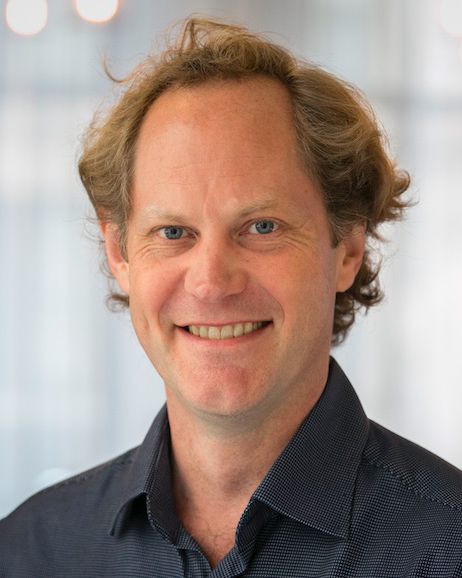Nigel Cooper

Prof Nigel Cooper
Professor of Theoretical Physics
Fellow of Pembroke College
Office: C3.054
Email: nrc25 @ cam.ac.uk
Personal web site
TCM Group, Cavendish Laboratory
Ray Dolby Centre,
JJ Thomson Avenue,
Cambridge, CB3 0US UK.

Research
Our research concerns the properties of many-particle quantum systems, motivated by new experimental capabilities and results on ultracold gases and on solid-state electronic materials. Some of our past work on ultracold gases has focused on ways in which atom-light coupling can be used to cause neutral atoms to behave as charged particles in a magnetic field, through artificial gauge fields. In relation to electronic materials, our recent research has explored novel topological phases of matter, and how their unusual properties could appear in experimental measurements.
Awards and Prizes:
2007 Maxwell Medal and Prize of the Institute of Physics
2012 Distinguished Scholar of the Max Planck Institute for Quantum Optics
2013 Humboldt Research Award
2013 EPSRC Established Career Fellowship
2017 Simons Investigator Award
2019 Lord Rayleigh Medal and Prize of the Institute of Physics

In Plain English
We are all very familiar with the different phases of matter that appear in the world around us, most notably the solid, liquid, and gas phases of water. Much of the research in the TCM group concerns the fact that, for other materials and in other circumstances, there can appear phases of matter that behave very differently from these three familiar phases. Research in my group focuses on the novel phases of matter that appear in situations where the motion of the constituent particles must be described by the laws of quantum mechanics. (For water at room temperature, the movements of individual molecules can be well described by classical mechanics, through Newton's laws, even if the forces that hold the atoms together into those molecules cannot.) One setting where quantum mechanics becomes important is for electrons moving through a metal or semiconductor: the quantum nature of their motion can give rise to novel phases of the 'electron gas', for example the superconducting phase in which electrons flow without friction. Another setting, only recently achieved in laboratory experiments, is when dilute gases of atoms are cooled to so-called 'ultracold' temperatures (less than 1 millionth of a degree above absolute zero). We are exploring the collective properties of these unusual ultracold gases, with the view to discover new phases of matter, which could have application to precision sensors based on ultracold atomic gases, or which could inform us of new forms of behaviour that might also appear for electrons in novel electronic materials.
Highlighted Research:
New evidence of an anomalous phase of matter, and here
Stable magnetic vortices, 3D vortex rings appear in a bulk magnet
Hidden symmetry could be key to more robust quantum systems, researchers find, also here or here
Physicists Observe Trippy 'Vortex Rings' in a Magnetic Material For The First Time
Magnetic Vortices Come Full Circle, also
here
Study unveils the unstable nature of some topological phases
Lindblad's tenfold way
Inside the quantum Hall effect
Toward Fractional Quantum Hall Physics with Cold Atoms
Mapping the Topology of a Cold World
A new phase for molecular superfluidity
An optical lattice of flux
Sorting superfluidity from Bose-Einstein condensation in atomic gases
Featured Publications
- Experimental realization of a fermionic spin-momentum lattice Phys. Rev. Lett. 128 245301 (2022)
- Moiré-induced optical non-linearities: Single and multi-photon resonances Phys. Rev. Lett. 128 207401 (2022)
- Nested-sphere description of the N-level Chern number and the generalized Bloch hypersphere Phys. Rev. Research 4 023120 (2022)
- Leaky exciton condensates in transition metal dichalcogenide moiré bilayers Phys. Rev. Research 4 l022042 (2022)
- Quantum oscillations in interaction-driven insulators SciPost Physics 12 123 (2022)
- Kramers' degeneracy for open systems in thermal equilibrium Phys. Rev. B 105 l121104 (2022)
- Realizing discontinuous quantum phase transitions in a strongly correlated driven optical lattice Nature Phys. 1 - 6 (2022)
- Low-frequency Quantum Oscillations from Interactions in Layered Metals Phys. Rev. Research 3 L042009 (2021)
- Elastic backscattering of quantum spin Hall edge modes from Coulomb interactions with non-magnetic impurities Phys. Rev. B 103 235164 (2021)
- Measuring the dynamics of a first order structural phase transition between two configurations of a superradiant crystal Phys. Rev. Research 3 L012024 (2021)
- Many-body Decay of the Gapped Lowest Excitation of a Bose-Einstein Condensate Phys. Rev. Lett. 126 060402 (2021)
- Out-of-equilibrium steady states of a locally driven lossy qubit array Phys. Rev. Research 3 L012016-1 - L012016-7 (2021)
- Long-Range Coherence and Multiple Steady States in a Lossy Qubit Array Phys. Rev. Lett. 125 240404 (2020)
- Steady states of a driven dissipative dipolar XXZ chain J. Phys. B - At. Mol. Opt. Phys. 53 135302 (2020)
- Fragility of time-reversal symmetry protected topological phases Nature Phys. 1 - 3 (2020)
- Kane-Mele with a twist: Quasicrystalline higher-order topological insulators with fractional mass kinks Phys. Rev. Research 2 033071 (2020)